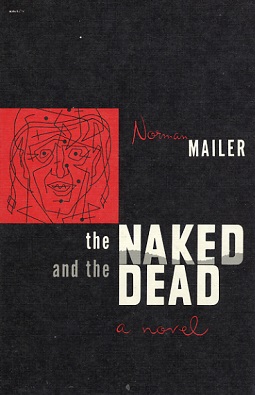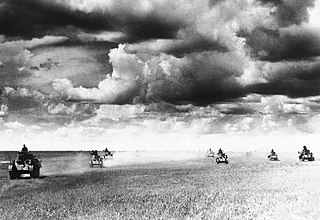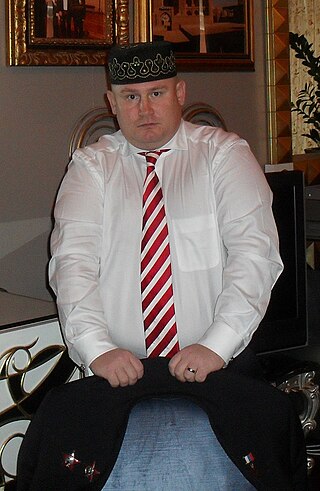Related Research Articles

Fragging is the deliberate or attempted killing of a soldier, usually a superior, by a fellow soldier. U.S. military personnel coined the word during the Vietnam War, when such killings were most often committed or attempted with a fragmentation grenade, to make it appear that the killing was accidental or during combat with the enemy. The term fragging now encompasses any deliberate killing of military colleagues.

The Naked and the Dead is a novel written by Norman Mailer. Published by Rinehart & Company in 1948, when he was 25, it was his debut novel. It depicts the experiences of a platoon during World War II, based partially on Mailer's experiences as a cook with the 112th Cavalry Regiment during the Philippines Campaign in World War II. The book quickly became a bestseller, paving the way for other Mailer works such as The Deer Park, Advertisements for Myself, and The Time of Our Time. He believed The Naked and the Dead to be his most renowned work. It was the first popular novel about the war and is considered one of the greatest English-language novels. It was adapted into a film in 1958.
![<i>Afghan Breakdown</i> 1991 [[Soviet Union]] film](https://upload.wikimedia.org/wikipedia/en/9/9f/Afghan_Breakdown_dvd_poster.jpg)
Afghan Breakdown is a 1991 war drama film about the Soviet–Afghan War directed by Vladimir Bortko and co-produced by Italy and the Soviet Union (Lenfilm). Michele Placido plays the protagonist, Major Bandura, a commander of a unit of Soviet paratroopers, co-starring with several popular Soviet actors.

The 9th Company is a 2005 Russian war film directed by Fedor Bondarchuk and set during the Soviet–Afghan War. The film is loosely based on a real-life battle that took place at Hill 3234 in early 1988, during Operation Magistral, the last large-scale Soviet military operation in Afghanistan. It received generally positive reviews from critics.

War and Peace is a 1956 epic historical drama film based on Leo Tolstoy's 1869 novel of the same name. It is directed and co-written by King Vidor and produced by Dino De Laurentiis and Carlo Ponti for Paramount Pictures. The film stars Audrey Hepburn as Natasha, Henry Fonda as Pierre, and Mel Ferrer as Andrei, along with Vittorio Gassman, Herbert Lom, Oskar Homolka, Anita Ekberg in one of her first breakthrough roles, Helmut Dantine, Barry Jones, Anna Maria Ferrero, Milly Vitale and Jeremy Brett. The musical score was composed by Nino Rota and conducted by Franco Ferrara.

Valentin Ivanovich Varennikov was a Soviet/Russian Army general and politician, best known for being one of the planners and leaders of the Soviet–Afghan War, as well as one of the instigators of the 1991 Soviet coup d'état attempt.
Charley's War was a British comic strip about World War I, written by Pat Mills and drawn by Joe Colquhoun.

The Soviet–Japanese border conflicts, also known as the Soviet-Japanese Border War, the First Soviet-Japanese War, the Russo-Mongolian-Japanese Border Wars or the Soviet-Mongolian-Japanese Border Wars, were a series of minor and major conflicts fought between the Soviet Union, Mongolia and Japan in Northeast Asia from 1932 to 1939.

The Tajbeg Palace assault, known by the military codename Operation Storm-333, was a military raid executed by the Soviet Union in Afghanistan on 27 December 1979. Special forces and airborne troops stormed the heavily fortified Tajbeg Palace in Kabul and assassinated Afghan leader Hafizullah Amin, a Khalqist of the People's Democratic Party of Afghanistan (PDPA) who had taken power in the Saur Revolution of April 1978. It was the start of the Soviet–Afghan War.
The Battle of Maravar Pass was an operation by the 334th Detached Spetsnaz group in the Afghan villages of Sangam and Daridam on April 21, 1985, during the Soviet–Afghan War. Mujahideen forces ambushed the Soviet force in Maravar Gorge, cutting off its 1st company and inflicting heavy casualties. As Soviet reinforcements arrived, the mujahideen covered the civilian evacuation of the gorge and successfully carried out a fighting withdrawal.
The Winter War is a 1989 Finnish war film directed by Pekka Parikka, and based on the novel Talvisota by Antti Tuuri. It is set in the Winter War and tells the story of a Finnish infantry regiment from Southern Ostrobothnia fighting on the Karelian Isthmus, focusing mainly on a platoon of reservists from Kauhava. The film was released in Finland and Sweden on 30 November 1989, the 50th anniversary of the beginning of the Winter War, and in the United States in December 1989.

John James Rambo is a fictional character in the Rambo franchise. He first appeared in the 1972 novel First Blood by David Morrell, but later became more famous as the protagonist of the film series, in which he was played by Sylvester Stallone. The portrayal of the character earned Stallone widespread acclaim and recognition. The character was nominated for American Film Institute's list 100 Years…100 Heroes and Villains. Following the success of the first movie, the term "Rambo" was occasionally used in media circles to describe a lone wolf who is reckless, disregards orders, uses violence to solve all problems, enters dangerous situations alone, and is exceptionally tough, callous, raw and aggressive.

The Battle of Kamdesh took place during the war in Afghanistan. It occurred on October 3, 2009, when a force of 300 Taliban assaulted the American Combat Outpost ("COP") Keating near the town of Kamdesh in Nuristan Province in eastern Afghanistan. The attack was the bloodiest battle for US forces since the Battle of Wanat in July 2008, which occurred 20 miles (32 km) away from Kamdesh. The attack on COP Keating resulted in 8 Americans killed and 27 wounded while the Taliban suffered 150–200 killed.

Grigory Yakovlevich Baklanov was a Soviet and Russian writer, well known for his novels about World War II, and as the editor of the literary magazine Znamya. Becoming the editor in 1986, during Mikhail Gorbachev's reforms, Baklanov published the works that were previously banned by Soviet censors; his drive for glasnost boosted the magazine's circulation to 1 million copies.

Aleksandra Grigoryevna Samusenko was a Soviet T-34 tank commander and a liaison officer during World War II. She was the only female tanker in the 1st Guards Tank Army.

Simon Mailloux is a serving officer in the Canadian Forces. He was severely injured on 16 November 2007 in an IED incident in Afghanistan. As a result, his left leg was amputated.

Leonid Khabarov is a former Soviet military officer whose battalion was the first Soviet Army unit to cross the border into the Democratic Republic of Afghanistan on December 25, 1979, serving as the de facto beginning of the decade-long Soviet–Afghan War. He received widespread media attention after he was arrested on charges of fomenting a coup d'état while serving as a Russian ROTC chief in 2011. He was accused of having created a master plot to overthrow local authorities in the Ural region of Russia for the purpose of launching a nationwide rebellion.

Elliot Ackerman is an American author and former Marine Corps special operations team leader. He is the New York Times–bestselling author of the novels 2034: A Novel of the Next World War, Red Dress In Black and White, Waiting for Eden, Dark at the Crossing, and Green on Blue, and the upcoming Halcyon: A Novel, as well as the memoirs The Fifth Act: America's End in Afghanistan and Placesand Names: On War, Revolution, and Returning. His books have received significant critical acclaim, including nominations for the National Book Award, the Andrew Carnegie Medals in both fiction and non-fiction, and the Dayton Literary Peace Prize. He served as a White House fellow in the Obama administration and is a Marine veteran who served in Iraq and Afghanistan. He is a contributing writer to The Atlantic and The New York Times. He was awarded the Silver Star, the Bronze Star with Valor, and a Purple Heart during his five deployments to Afghanistan and Iraq.

Iliyas Daudi is a Russian military writer-novelist, publicist, a member of the Writers' Union of Russia. Screenwriter and a filmmaker. In the past he was the Soviet military serviceman, the veteran of the Soviet–Afghan War, the Hero of the Russian Federation.

Nikolai Ivanovich Galushkin was one of the top Soviet snipers during World War II. Despite tallying 418 fascists during the war and being nominated for the title Hero of the Soviet Union on two occasions, he did not receive the title, and was instead awarded the Order of Lenin for his achievements as a sniper until being awarded the title Hero of the Russian Federation on June 21, 1995.